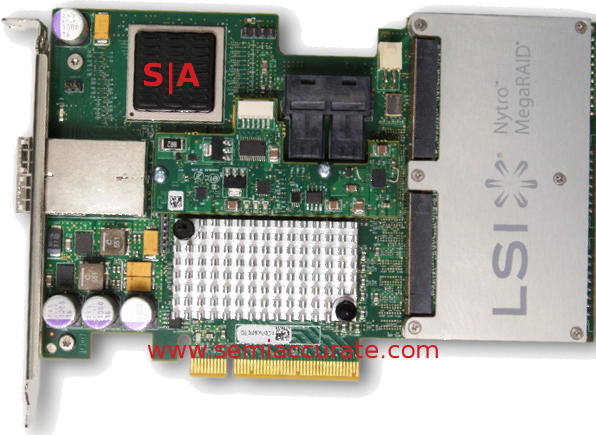![]() If you have fond memories of the LSI Nytro MegaRAID card from last year, the new 8140-8e8i will make your day. If you are not in to massive flash caches on industrial strength RAID cards, this product probably won’t do much for you.
If you have fond memories of the LSI Nytro MegaRAID card from last year, the new 8140-8e8i will make your day. If you are not in to massive flash caches on industrial strength RAID cards, this product probably won’t do much for you.
The new 8140-8e8i is easy to describe, a 16-port LSI SAS-6 RAID card with eight internal and eight external mini-SAS ports. On top of this there are four 400GB SSDs with an unspecified but likely Sandforce SF-2000 family controller backing them. Add on a new firmware build with some added features and you get a full height card that looks like this.

1.6TB of flash to back 236 SAS drives
As you can see on the image above, LSI added a SAS expander to the MegaRAID card, it is the black box under the S|A logo. That bumped the supported drive count from a mere 128 to a much more reasonable 236, probably 256 minus 16 for the expander and four for the flash channels. Those four channels were made possible by the full height of the card, the older half-height device only could fit two.
That extra flash bandwidth and capacity is actually needed to support large drive counts, the older version could have drive count limited by available cache capacity. That 1.6TB of flash should be enough for most sane drive configurations but the data center is a place where what a user considers sanity is rarely found. In any case if you were limited by the flash in the 1TB model, this one will let you run 60% more drives per PCIe slot.
There are two new features added to the card that are related to the flash, cache statistics and storage capabilities. If you recall from the last version, some of the cache was available to the user for storage. This could be used as a boot drive, RAIDed, or just used as a plain SSD, but some was always dedicated to cache duties. In the 8140-8e8i you can use all of the flash capacity as an SSD, all to cache, or anything in between. Not exactly an earth shattering change but useful to some.
The other difference is what LSI calls Advanced Cache Statistics (ACS) which is about what its name suggests. How much to partition and what to dedicate it to can make a major difference to performance but visibility in to low-level goings on during testing is traditionally very limited. With ACS you can start it off, run your tests on the card, and will actually see what happens in great detail.
After the run you can download the results and ACS will give you nine different statistics to ponder. Those would be Hit Count, Miss Count, Cache Fills, Cache Flushes, Total Cache Windows, Dirty and Non-Dirty Cache Windows, Host Statistics, and Virtual Disk Statistics. If that isn’t enough, well they will probably add some stuff with the next firmware update, put your suggestions in now.
This is all necessary because as you might guess a ROC, SAS expander, and four heavily overprovisioned SSDs that total 1.6TB aren’t cheap, $9995 to be exact. The cards aren’t going to be released until “Q2” but don’t expect it to be later in that time frame. There is a special pre-order deal going on now, buy more than 20 and LSI will give you $3 off per unit, ask your rep for details (1). Then again if you need this type of device, the performance per dollar isn’t all that bad, especially for a datacenter oriented device.S|A
(1) This is a joke, don’t hold LSI to it. That said if you are buying 20 or more $9995 cards, you will probably get them for notably less than MSRP.
(1) Happy April Fool’s
Have you signed up for our newsletter yet?
Did you know that you can access all our past subscription-only articles with a simple Student Membership for 100 USD per year? If you want in-depth analysis and exclusive exclusives, we don’t make the news, we just report it so there is no guarantee when exclusives are added to the Professional level but that’s where you’ll find the deep dive analysis.
Charlie Demerjian
Latest posts by Charlie Demerjian (see all)
- Microsoft Absolutely Screws Intel and AMD Over AI PCs - May 8, 2024
- Qualcomm Is Cheating On Their Snapdragon X Elite/Pro Benchmarks - Apr 24, 2024
- What is Qualcomm’s Purwa/X Pro SoC? - Apr 19, 2024
- Intel Announces their NXE: 5000 High NA EUV Tool - Apr 18, 2024
- AMD outs MI300 plans… sort of - Apr 11, 2024